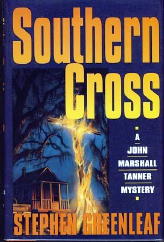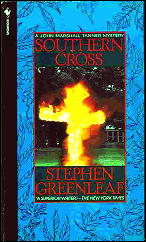Sun 4 Jul 2010
Reviewed by Barry Gardner: STEPHEN GREENLEAF – Southern Cross.
Posted by Steve under Reviews[4] Comments
STEPHEN GREENLEAF – Southern Cross. Wm Morrow & Co, hardcover, November 1993. Paperback reprint: Bantam, February 1995. John Marshall Tanner #9

After being disappointed by Valin and Lyons this year, and finding Jerry Healy’s mediocre for him, Greenleaf was my last PI hope for 1993. *Sigh.*
Tanner returns to the Midwest for a reunion of his college graduating class, looking for answers to questions he’s not even sure how to ask. He meets old friends there, and an old lover, and one of the friends asks for his help.
A civil rights worker in the 60s, the friend is being threatened by a group of racists. He doesn’t know who they are or why they’ve targeted him, but he does take them seriously, and wants Tanner to find out these things and make them go away.
Still looking for his own answers, Tanner accepts, and [heading for Charleston SC] wanders into a magnolia-scented world that he doesn’t know. As you might expect, everybody has secrets, and as usual few of them are happy ones.
Greenleaf is different from most PI writers in that he deals with what people do to one another, not only on the small, personal scale, but in terms of larger societal issues as well. He is a social and political liberal, and this attitude infuses his books.

Here, of course, he has much to say about bigotry and race, and what it’s done to us all. As always, Tanner is as much a man of thought and meditation as of action; another defining characteristic of Greenleaf’s books is that they tend to be much more philosophical than those of other PI writers.
Cross is a detective story and a mystery of sorts, but there is little violence. Greenleaf’s writing is as powerful as ever, but the story itself didn’t hold together for me. Tanner makes too many connections with too little evidence, and the motivations of the eventually unmasked villain were simply not believable.
Too many words were spent on Tanner’s angst and Greenleaf’s thoughts on racism, and not enough establishing the connections between the characters that might have rationalized the story.
I didn’t dislike the book — I like Greenleaf’s writing too well — but it disappointed me considerably.
Previously reviewed on this blog:
Beyond Blame (by Steve Lewis)
For a long overview of Greenleaf’s books by Ed Lynskey, and an interview he and I did with the author several years ago, may I recommend that you go here on the main Mystery*File website. You’ll find a complete bibliography there as well.
July 5th, 2010 at 12:38 am
By 1993 I had slipped away from the genre for a while and missed this one, only picking it up a couple of years ago, but of that group of writers — Lyons, Healy, Valin, Greenleaf was always a standout because of his protagonist, John Marshall Tanner. He may not have been as tough as Harry Stoner or as quirky as John Francis Cuddy, but he had a weight as a character that the others sometimes lacked.
As the review states Tanner could get a bit lost in his own angst, and in general I get easily annoyed with writers who dispatch their sleuths to the South so they can discover racism, as if it doesn’t exist throughout American society and is somehow only visible if attached to a southern accent. But I’m sure people in other regions have the same quibble — people in Boston, Long Island, and Philadelphia must tire of the implication they house the country’s only snobs; that everyone in California is a kook; that everyone in Kansas is a farmer; or that everyone in Texas is a cowboy, oilman, or redneck.
But I still enjoy Greenleaf’s version of the hard-boiled private eye and Tanner’s intelligent take on it. Tanner was both an attractive and believable sleuth.
Greenleaf came closest to what Chandler and Ross Macdonald both tried — to write a mystery novel that was as much novel as mystery. I’m not sure any of them fully succeeded, but it was a noble effort.
I agree this wasn’t prime Greenleaf or Tanner, but even minor Greenleaf and Tanner is worth reading.
July 5th, 2010 at 1:15 am
Greenleaf’s model in the writing of his PI novels was Chandler to some extent, but it was Ross Macdonald whose path he was most closely trying to follow.
From the interview, he said:
“I cut my mystery-reading teeth on Erle Stanley Gardner (I was sent home from the fifth grade for taking Perry Mason to school, mostly because of the decolletage on the cover. Long before I wanted to be Ross Macdonald I wanted to be Perry Mason.)
“I quickly grew to enjoy Richard S. Prather, the pre-McGee John D. MacDonald, and Rex Stout, among many others, and of course Hammett and Chandler. But Ross Macdonald was my model, beginning to end, in terms of both style and substance.”
I agree with you, David, that Greenleaf was also doing his best to write novels as well as mysteries, but I don’t think he ever succeeded, either on his terms, or his readers. I’m sure glad he tried, though.
July 5th, 2010 at 2:04 am
There is something noble about your reach exceeding your grasp, which was true of Greenleaf. Admittedly he didn’t have Macdonald’s gift for metaphor and simile, and perhaps stretched a bit in that area, but even within the framework of imitating Chandler and Macdonald, he was trying to do something a bit different, and if he never quite made it, the result was interesting.
The problem for the Macdonald school is that while Chandler imitators might with some talent approach some of the rhythm and music of Marlowe it’s a lot harder to imitate Ken Millar’s intelligence.
Marlowe, being a character, can be imitated and copied — Archer, being an idea and an attitude, is somewhat harder to copy (Ron Goulart did a fair short parody though). The Marlowe school has a character and an attitude as well as a way of writing to follow, but the Macdonald school has only a voice and a few themes and the use of metaphor and simile.
I’m not sure any of he Macdonald imitators were really successful in the same sense some of the Chandler imitators were because of that, but the effort was worth it. Though Greenleaf never really succeeded, I read them with a good deal of interest.
December 4th, 2011 at 12:16 pm
The review is right on target about too much angst and soul searching by characters. After all, we’re reading for mystery, not philosophy from a mystery writer.
The book had me running to the dictionary a few times. By the end of the book, I felt many words were slightly misused, as if Greenleaf just bought a new thesaurus.